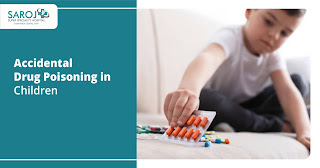An accidental drug poisoning happens when a person consumes a big dose of prescription drugs or medicines which were not recommended to them. Due to their inquisitiveness, children are most vulnerable to such situations of accidental ingestion.
Experts at the Best Super Speciality Hospital in Delhi report that the majorpercent of reported accidental drug poisoning in young kids occur because:
1.Adults quite often struggle to maintain medications out of their child's grasp.
2.Young kids try new prescription drugs in unfamiliar surroundings
3.The omission of tamper-proof drug wrapping
Identifying Signs
If you highly doubt that your youngster has ingested an unidentified drug, look for signs such as:
1.Nausea and stomach pain
2.Vomiting
3.Diarrhoeaor blood in the urine
4.Shivers or flu
5.Dizzy spells, tiredness, and uncertainty
6.Heart rates, hypertension, and minute ventilation are all oscillating.
7.Breathlessness and pain in the chest
In case you suspect that your little one is showcasing any of the above-mentioned signs, don’t think twice and seek medical attention immediately at the Best Emergency Care Hospital in Delhi.
These are some of the most prevalent prescription drugs and hygiene products discovered in kids' overdoses. Consuming these can lead to severe symptoms, if not a fatality, in youngsters.
1.Iron: Iron is frequently used by adults having to suffer from anemia. Overdose signs include severe abdominal pain, puking, and indigestion.
2.Blood pressure medications: Beta-blockers such as metoprolol and atenolol, along with calcium channel blockers like amlodipine and verapamil, can end up causing extremely low blood pressure or pulse rate in children.
3.Diabetes prescription drugs: Metformin and sulfonylureas like glibenclamide, can markedly change the amount of sugar as well as other substances in a child's body, causing health problems ranging from drowsiness and tummy pain to seizure activity and coma.
4.Sleeping pills: Zolpidem (Ambien), can cause fatigue and coma.
5.Blood thinners: Warfarin, a medicine used to treat irregular heartbeats and thrombosis, can cause dark or bloody puking or gastrointestinal bleeding at first.
6.GI medications: Laxatives can cause serious dehydration and dysentery.
7.Loperamide: Contains anti-diarrhoea medications that can cause fatigue or coma. Loperamide is an opiate equivalent to morphine, and young kids are particularly prone to its cognitive effects than grownups.
8.Tylenol: Tylenol can cause acid reflux and consequence in sudden liver dysfunction.
9.Aspirin: Aspirin can cause nausea, fast heartbeat, irritation, and fainting spells.
Actions to do during waiting for medical aid
Whereas each instance of drug poisoning may necessitate a distinct method of treatment, you could indeed follow the directions below until paramedics arrive:
Assemble any prescription bottles, containers, or parcels in your child's immediate area so that you can notify your physician about the possible drug. If you notice that your baby is not breathing, perform CPR to provide artificial respiration and keep the circulation going.
Ways To Prevent Such Instances
1.Keep all prescription drugs out from the grasp of small kids, as well as those you take on a daily basis.
2.Educate kids about the health hazards of ingesting prescription drugs that have not been recommended to them.
3.Notify your guests about medication management so that they can keep their possessions out of range of your kids.
4.Don't even end up leaving the children's medicine within reach.
Accidental drug poisoning in children has been increasing steadily. Informing individuals, trying to remain vigilant in the case of children, and introducing child-proof packing materials are all essential steps to take in an attempt to stop such accidents. The Best Super Speciality Hospital in Delhi has a 24*7 emergency department , and it’s experts are always ready for cases like this. Trust them and know what is the best treatment linage in such instances.




